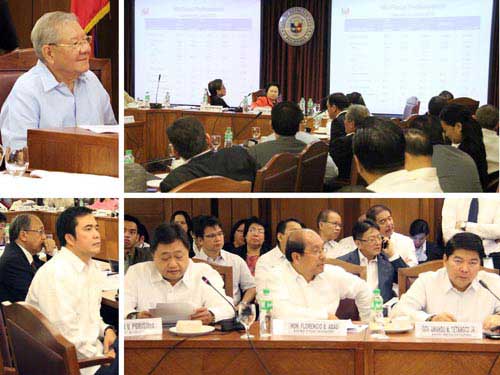
EMPOWERMENT BUDGET. Budget Secretary Florencio Abad, with Finance Secretary Cesar Purisima and Bangko Sentral ng Pilipinas Gov. Amando Tetangco, Jr., briefs members of the House Committee on Appropriations chaired by Cavite Rep. Joseph Emilio Abaya, in the presence of Speaker Feliciano Belmonte, Jr. at the start of the public hearings on the proposed P2.006-trillion 2013 General Appropriations Act which President Benigno Aquino III considers as an “empowerment budget.” Chairman Abaya is confident that the 2013 spending bill will be reported out in plenary by the first week of September in consonance with Speaker Belmonte’s declaration that there will be no reenacted budget as in previous years under his leadership.
QUEZON CITY -The proposed 2013 P2.006-trillion national budget will hasten implementation of the priority programs under President Benigno Aquino’s “social contract” with the Filipino people, Budget Secretary Florencio Abad stressed.
Secretary Abad made the statement at the start of thepublic hearing being conducted by the House Committee on Appropriations chaired by Rep. Joseph Emilio Abaya (1st District, Cavite) at the Andaya Hall of the House of Representatives.
Also on hand to brief the appropriations panel are Finance Secretary Cesar Purisima and Bangko Sentral ng Pilipinas Governor Amando Tetangco, Jr. who both explained the government’s financial status, monetary policy reforms and the status of the banking sector, to mention a few vital concerns that relate to the administration’s proposed spending law.
Calling the proposed national outlay a budget for people empowerment, as the President called it during the formal turn-over of the proposed 2013 General Appropriations Act the day after the SONA, Sec. Abad underlined the core principles behind the spending bill.
The core principles include: 1) greater and deeper commitment to the Aquino Social Contract; 2) accelerated completion of priority program targets; 3) stronger government accountability to perform; 4) transparency for faster budget execution and clearer results; and 5) greater stakeholder participation in budget preparation and execution.
Abad said that Greater focus on the Social Contract means, among other goals, good governance to attain peace and rule of law, integrity of the environment, inclusive growth and elimination/reduction of poverty.
“We have introduced program budgeting and the sustained use of zero-based budgeting,” Abad told the Appropriations committee briefing.
Abad, among others, emphasized that the proposed spending bill reflects government’s focus on judicial reforms, quality education, the attainment of lasting peace and infrastructure programs including electrification projects to spur community development nationwide.
Tetangco and Purisima noted that the Philippines enjoys good macro fundamental following two decades of structural reforms that, among others, include: 1) the creation of the Bangko Sentral ng Pilipinas in 1993; 2) Liberalization of foreign bank entry in 1994; 3) Liberalization of the telecommunications Industry in 1995; 4) Privatization of the water services (MWSS & Maynilad) in 1997; 5) Deregulation of the oil industry and adoption of consolidated bank supervision in 1998;
6) Passage of the General Banking Law and Philippine E-Commerce Act in 2000; 7) Liberalization of the power sector (EPIRA) in 2001; 8) Adoption by BSP of IT Framework and the passage of the special Purpose Vehicle Act in 2002; 9) Passage of the Government Procurement Reform Act in 2003; 10) Passage of the Securitization Act and Adoption of Basel 2 in 2004; 11) Passage of the Value-Added Tax (E-Vat) in 2005; 12) Full implementation of risk-based bank supervision in 2007; and the Guidelines on adopting PFRS 9 and Adoption of Phased-in migration to Basel III in 2011.



 ShareThis
ShareThis